JDM 2005 HAS BEGUN

The JDM conference is underway, and Decision Science News is there, in fact posting from the lobby.
9:20 AM Canada is a crisp 45 something degrees. The registration table is open (and outside the Essex ballroom on the 2nd floor), and much more is bound to happen.
Saturday One psychologist, with only 4 hours prep time, has to cover for a colleague who had to back out at the last minute. The result: hilarious improvisation.
Sunday Robyn Dawes gives a talk on the (non)value of interviews, which is not only informative, but hilarious.
Sunday night Dancing, which only started at JDM Dallas ’98, is now quite popular. The conference took over the entire Fez Batik club, and afterpartied across the street.
Monday afternoon Well, that’s about it for the JDM conference. Paul Slovic gave a compelling talk on genocide: one of several at the conference on charitable appeals.
Toute Corte: DSN has noticed that the SJDM conference is trending social-psychological. More affect, fewer probabilities.
SOME EASY THINGS TO DO TO IMPROVE YOUR CHANCES OF SUCCESS AS AN ACADEMIC

Decision Science News was recently asked to give a talk on simple strategies for doing research.
Rewrite things many times. Someone, perhaps Woody Allen, said “Writing is hard. Rewriting is easy.”
Write as if you’re writing the final version. If it looks nearly done, you’ll fool yourself into thinking it’s nearly done, and you’ll actually finish it.
Read every article someone has published. You can’t do this with Herbert Simon, but you can do it with Egon Brunswik and many other great minds. Read 10 pages every morning into a tape recorder. You’ll be surprised at how little time it takes and how empowering it is.
Find your secret weapon. Newell and Simon made early advances in Psychology and Artificial Intelligence in part because they had access to a computer when almost nobody else did. What do you have access to that others don’t?
Use catchy names. And otherwise write like someone whose job it is to write. Who doesn’t want to be entertained?
Bet. Bet on scientific hypotheses with your research group. It accelerates the pace of research.
Approach people in other fields and say “have you ever thought about combining what you do with what I do?”. If they’re bright, they have. It may lead to groundbreaking research.
Build simple models. If models were supposed to be complicated, they’d be called thephenomenoninquestions. Adding parameters reduces generalizability (proof).
Pose questions. And get people to answer. Questions turn passive listeners into active collaborators.
Use three-dimensional representations. Print things out, cut them up, tape them together, rotate them in space.
Understand statistics. Especially exploratory data analysis (EDA). You’ll find yourself in a valued minority.
COMPETITOR-ORIENTED OBJECTIVES: THE MYTH OF MARKET SHARE
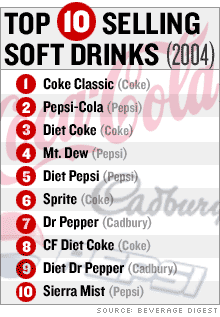
You run a business. An advocate of focus, you decide to put all your energies behind one pursuit. You come down to a list of two candidates:
- Strive to maximize market share
- Strive to maximize profit
Perhaps the difference is hard to see at first. They are correlated. Adherents of the “business is war” school would focus on the market share: kill the competition or it will eventually come back to get you. Economists would say focus on the profit. What to do?
Decision Science News is partial to systematic approaches to making decisions and conducting research and likes the style of this working paper which goes after the profit vs. market share question in an refreshingly clear way:
Competitor-oriented Objectives: The Myth of Market Share by J. Scott Armstrong and Kesten C. Green
Filed in
Conferences
 Subscribe
Subscribe to Decision Science News by Email (one email per week, easy unsubscribe)
MORE INFORMATION ON THE JDM 2005 ANNUAL CONFERENCE IN TORONTO

The Society has made available a revised program, a city map and a floorplan. We at DSN find this sort of information handy, and look forward to seeing you at JDM, our favourite conference.
If you have not registered, it is not too late.
Filed in
Gossip
 Subscribe
Subscribe to Decision Science News by Email (one email per week, easy unsubscribe)
THE SOCIETY FOR NEUROECONOMICS
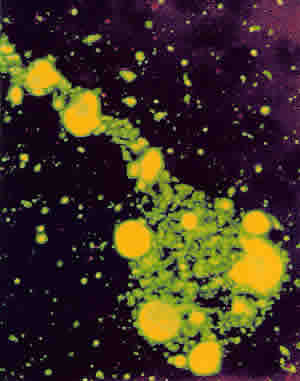
The Society for Neuroeconomics promotes the research and dissemination of knowledge in neuroeconomics. The society was incorporated in 2005 after meeting informally at workshops and other meetings over the last five years.
What is Neuroeconomics?
Neuroeconomics is a multidisciplinary research field incorporating neuroscience, economics, and psychology aimed at developing an understanding of how we make choices. It looks at the brain when we evaluate decisions, categorize risks and rewards, and when we interact with others. (from Wikipedia)
“Neuroeconomics is an interdisciplinary research program with the goal of building a biological model of decision making in economic environments. Neuroeconomists ask, how does the embodied brain enable the mind (or groups of minds) to make economic decisions? By combining techniques from cognitive neuroscience and experimental economics we can now watch neural activity in real time, observe how this activity depends on the economic environment, and test hypotheses about how the emergent mind makes economic decisions. Neuroeconomics allows us to better understand both the wide range of heterogeneity in human behavior, and the role of institutions as ordered extensions of our minds.” (from the Neuroeconomics Explained post from professor Kevin McCabe’s Weblog)
Read more about Neuroeconomics here.
The Society for Neuroeconomics Current Officers:
President:
Colin Camerer
Secretary/Treasurer:
Aldo Rustichini
Chief Information Officer:
Kevin McCabe
Immediate Past President:
Paul Glimcher
Full Program of the last Society conference, with abstracts
Filed in
Conferences
 Subscribe
Subscribe to Decision Science News by Email (one email per week, easy unsubscribe)
SOCIETY FOR JUDGMENT AND DECISION MAKING 2005 ANNUAL CONFERENCE

The Society for Judgment and Decision Making is an interdisciplinary academic organization dedicated to the study of normative, descriptive, and prescriptive theories of decision. Its members include psychologists, economists, organizational researchers, decision analysts, and other decision researchers. The Society’s primary event is its Annual Meeting at which Society members present their research.
The Society for Judgment and Decision Makingâs Annual conference will be held at the Sheraton Centre in Toronto, ON, Canada, from November 12-14, 2005. As in 2004, A full day (Saturday) has been added to the schedule to make room for more presentations and for two Keynote Speakers.
Keynote Speakers
⢠Keynote speaker #1: Michael Posner, Professor Emeritus of Psychology, University of Oregon, and author of many path-breaking articles on neural mechanisms and structures underlying selective attention.
⢠Keynote speaker #2: Nassim Nicholas Taleb, luminary, friend of Decision Science News, and author of Fooled by Randomness.
Women in SJDM
Friday November 11, 2005 from 3:00 â 5:00 pm
City Hall Room of the Sheraton
This is the 2nd annual Women in SJDM conference networking event to
promote advancement of women in the field of JDM. The event will begin with a panel discussion of leading female JDM scholars who will cover topics such as salary negotiation and disparities between men and women, dual-career issues, work/family issues, and tenure angst. Panelists include Linda Babcock, Maya Bar-Hillel, Colleen Moore, Sandra Schneider, and Elke Weber. The event will end with an informal networking session. Both men and women who are interested in these and similar topics are encouraged to attend. Coffee and pastries will be served.
Awards
⢠The Best Student Poster Award is given for the best poster presentation whose first author is a student member of SJDM.
⢠The Jane Beattie Travel Memorial Scholarship subsidizes travel to the United States for scholarly pursuits related to JDM research, including attendance of the annual meeting.
Program Committee
Craig Fox (institutional memory)
Dan Ariely (program chair)
Derek Koehler (conference coordinator)
Ellen Peters (speaker coordinator)
George Wu (poster chair)
Judy Lin (Organizer galore)
Maya Bar-Hillel (fearless president)
Mike DeKay (institutional memory)
Rachel Croson (communications)
Rebecca Ratner (social chair)
Yuval Rottenstreich (equipment coordinator)
Hotel Information
This yearâs meeting will be held at the Sheraton Centre, Toronto. Sheraton Centre, Toronto 123 Queen Street West Toronto, Ontario M5H 2M9 Canada (416) 361-1000 http://www.sheratontoronto.com/
Further details regarding this event are available at http://www.sjdm.org or http://www.sjdm.org/programs/2005-hotel.pdf
Filed in
Conferences
 Subscribe
Subscribe to Decision Science News by Email (one email per week, easy unsubscribe)
THE 27TH ANNUAL MEETING OF THE SOCIETY FOR MEDICAL DECISION MAKING (SMDM).

This yearâs SMDM Annual Meeting will take place from October 21-24, 2005 in San Francisco, CA. The meeting hotel is the Hyatt Regency in San Francisco.
The theme of the 2005 meeting will be Translating Medical Decision Making Research into Practice. We plan to highlight the ways in which decision science – ranging from decision analysis, clinical decision aids, cost-effectiveness analysis, and clinical modeling is translated into clinical care and health system operations. We encourage submission of abstracts in all relevant areas, with a particular emphasis on this yearâs theme of translating knowledge into practice. As we will have an overlapping session with ISOQOL, we are also interested in abstracts of interest to members of both societies. Abstracts for all oral and poster presentations will be selected by reviewers representing a range of disciplines, who are blinded to authorship.
We will be featuring distinguished speakers presenting cutting-edge research that highlights the importance of the psychological context within which medical decision making occurs. Our goal is to begin a conversation among the membership about the importance of the underlying psychological processes of medical decision making and to continue to build on this theme in the coming years.
The Society for Medical Decision Making’s mission is to improve health outcomes through the advancement of proactive systematic approaches to clinical decision making and policy-formation in health care by providing a scholarly forum that connects and educates researchers, providers, policy-makers, and the public.
Register for the SMDM 2005 Conference online
Download the 2005 Annual Meeting Brochure and registration form here
Search and view the oral and poster abstracts from the upcoming 2005 SMDM Annual Meeting
Filed in
Conferences
 Subscribe
Subscribe to Decision Science News by Email (one email per week, easy unsubscribe)
DECISION MAKING@SPSP 2006 PRE-CONFERENCE
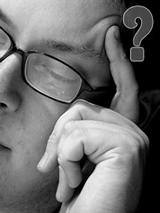
All are invited to attend and present at the first ever Pre-Conference on Judgment and Decision Making preceding the January 2006 SPSP meeting in Palm Springs, CA. The inaugural JDM@SPSP pre-conference will be held during the evening of January 25th and during the day of January 26.
The goal of the JDM@SPSP pre-conference is to highlight the emerging nexus of social, personality, judgment, and decision making research. The meeting features an exciting lineup of speakers:
Barry Schwartz
Brian Knutson
Daniel Gilbert
Daniel Kahneman
George Loewenstein
Jennifer Lerner
Norbert Schwarz
Tom Gilovich
With generous support from the Society for Judgment and Decision Making, and the NSF’s programs on Social Psychology and Decision, Risk and Management Science, the pre-conference will offer 20 competitive travel scholarships ($300) to graduate students who are first author on a poster. In addition, all graduate students who register for JDM@SPSP will receive a 1-year (2005) subscription to the Journal of Behavioral Decision Making. The deadline for poster submissions is December 1.
Registration is now open and will close when our limited space is filled or December 31, whichever comes first.
Organizers:
Dan Ariely, Jennifer Lerner, Leif Nelson and Leaf Van Boven
Filed in
Books
 Subscribe
Subscribe to Decision Science News by Email (one email per week, easy unsubscribe)
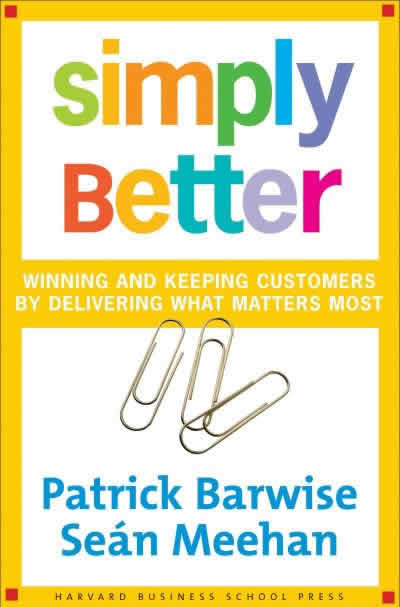
The AMA Foundation announces Simply Better: Winning and Keeping Customers by Delivering What Matters Most by Patrick Barwise and Sean Meehan as the recipient of the 2005 Berry-AMA Book Prize. The book offers a “back to the basics” approach to marketing by advocating that consumers want products that are “simply better” in terms of quality, reliability and value. Barwise and Meehan outline an actionable framework for managers to be able to understand customer needs and to create reliable solutions to meet those needs.
Patrick Barwise is Professor of Management and Marketing and Chair, Marketing Faculty for the London Business School. Sean Meehan is the Martin Hilti Professor of Marketing and Change Management at IMD, in Laussanne, Switzerland.
The DSN editor is proud to be London Business School colleagues with the winner and a finalist for the Berry Book Prize, the latter being Tim Ambler for Marketing and the Bottom Line.
The 2005 Berry/AMA Book Prize finalists were:
Accountable Marketing : The Economics of Data-Driven Marketing (Thomson Texere), by Peter Rosenwald
(Thomson Texere), by Peter Rosenwald
Effective Advertising : Understanding When, How, and Why Advertising Works (Marketing for a New Century) (Sage Publications), by Gerard J. Tellis
(Sage Publications), by Gerard J. Tellis
Marketing and the Bottom Line, Second Edition (Prentice Hall, Pearson Education), by Tim Ambler
(Prentice Hall, Pearson Education), by Tim Ambler
Purple Cow: Transform Your Business by Being Remarkable (Penguin Group), by Seth Godin
(Penguin Group), by Seth Godin
Simply Better: Winning and Keeping Customers by Delivering What Matters Most (Harvard Business School), by Patrick Barwise and Sean Meehan
(Harvard Business School), by Patrick Barwise and Sean Meehan


Filed in
Jobs
 Subscribe
Subscribe to Decision Science News by Email (one email per week, easy unsubscribe)
ASSISTANT PROFESSORSHIP TENURE TRACK POSITIONS IN PSYCHOLOGY AVAILABLE
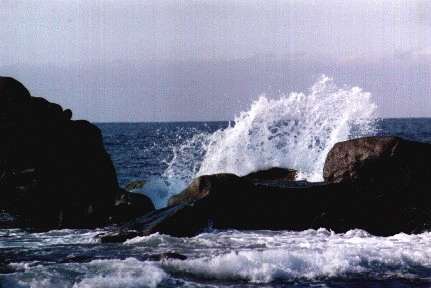
EXPERIMENTAL PSYCHOLOGY: University of California, San Diego (http://psy.ucsd.edu). The psychology department at UCSD invites applications for an Assistant Professor (with the possibility of a more senior hire pending availability of funding) tenure track, in Experimental Psychology. We seek an individual who is pursuing research in any substantive area of experimental psychology (e.g., social, developmental, cognitive, perception, learning, neuroscience, emotion, etc.) with clear implications for understanding the mechanisms of psychopathology. Salary is commensurate with qualifications and based on UC salary scales. Candidates should send letter, curriculum vita, research statement, reprints, and names of three referees to Experimental Psychology Search Committee – JDMS; Department of Psychology, 0109; University of California, San Diego; 9500 Gilman Drive; La Jolla CA 92093-0109. Immigration status of non-citizens should be stated in the vita. Complete applications received by Monday, October 31, 2005 will receive full consideration, but applications will be accepted until the position is filled. The University of California is an Affirmative Action/Equal Opportunity Employer with a strong institutional commitment to the achievement of excellence and diversity among its faculty and staff.
Craig R. M. McKenzie
Associate Professor
Department of Psychology
9500 Gilman Drive – MC 0109
UC San Diego
La Jolla CA 92093-0109
http://psy.ucsd.edu/~mckenzie/
APPLIED PSYCHOLOGY: University of California, San Diego (http://psy.ucsd.edu). The Psychology Department at UCSD invites applications for an Assistant Professor (with the possibility of a more senior hire pending availability of funding) tenure track, in any area of Applied Psychology. We seek an individual who is pursuing research with an applied emphasis in any area of experimental psychology (e.g., social, developmental, cognitive, perception, learning, neuroscience, etc.). Salary is commensurate with qualifications and based on UC salary scales. Candidates should send letter, curriculum vita, research statement, reprints, and names of three referees to Applied Psychology Search Committee – JDMS; Department of Psychology, 0109; 9500 Gilman Drive; University of California, San Diego; La Jolla CA 92093-0109. Immigration status of non-citizens should be stated in the vita. Complete applications received by Monday, October 31, 2005 will receive full consideration, but applications will be accepted until the position is filled. The University of California is an Affirmative Action/Equal Opportunity Employer with a strong institutional commitment to the achievement of excellence and diversity among its faculty and staff.
Craig R. M. McKenzie
Associate Professor
Department of Psychology
9500 Gilman Drive – MC 0109
UC San Diego
La Jolla CA 92093-0109
http://psy.ucsd.edu/~mckenzie/
 Subscribe to Decision Science News by Email (one email per week, easy unsubscribe)
Subscribe to Decision Science News by Email (one email per week, easy unsubscribe)










